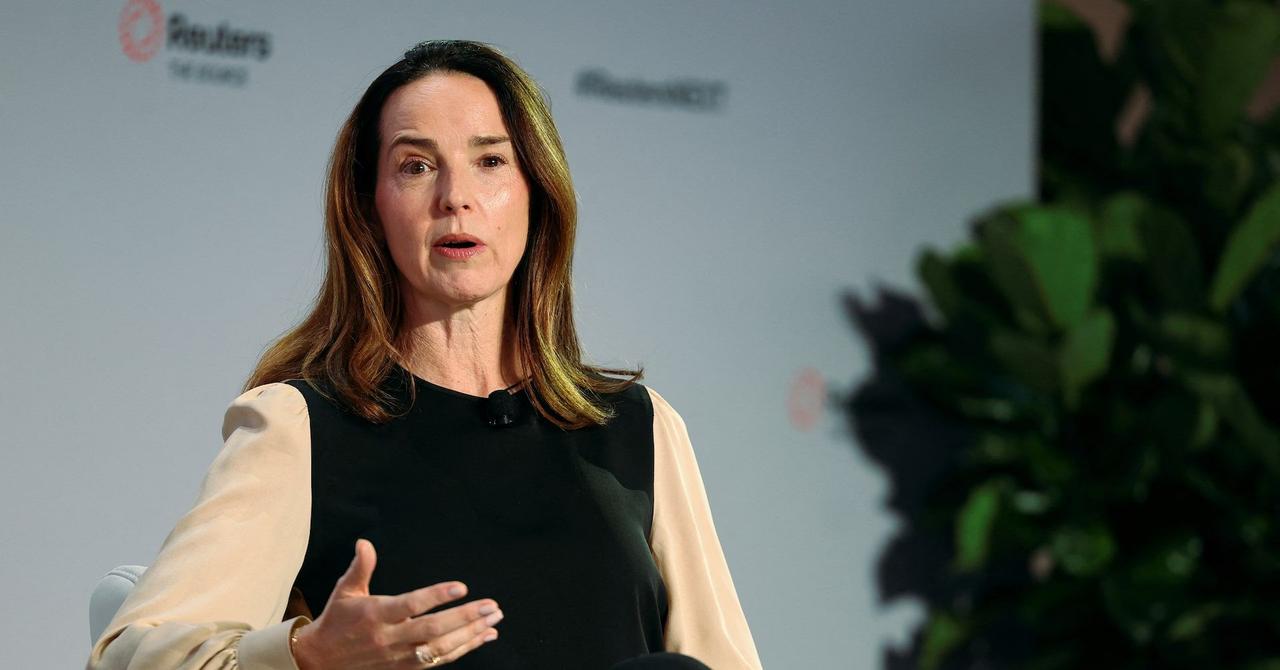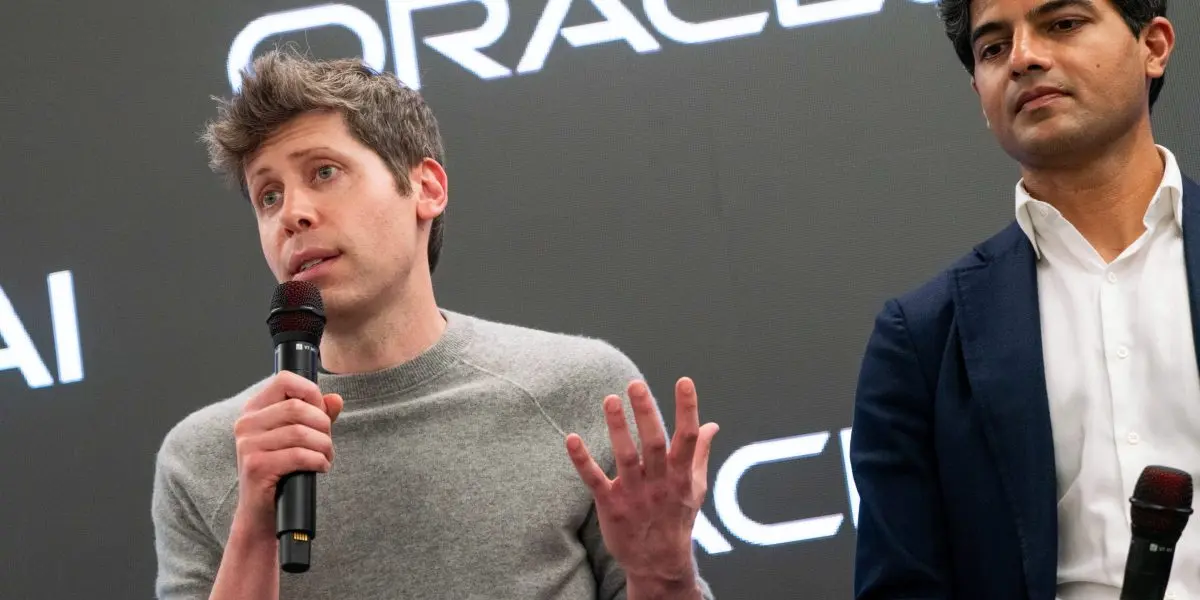OpenAI CFO Hints at Potential IPO Following Restructuring
6 Sources
6 Sources
[1]
OpenAI CFO says new structure opens door to potential future IPO
DUBLIN, May 28 (Reuters) - OpenAI's restructuring plans open the door to a potential future IPO, but any such decision would depend on the mood in public markets as well as the readiness of the company, Chief Financial Officer Sarah Friar said on Wednesday. OpenAI, in which Microsoft (MSFT.O), opens new tab has invested more than $13 billion, outlined plans in December to convert its for-profit arm into a public benefit corporation, a structure designed to balance shareholder returns with social goals, unlike nonprofits, which are solely focused on public good. The ChatGPT-maker dialed back the plan earlier this month so that the nonprofit parent would continue to control the PBC and become a big shareholder in it, while still allowing its for-profit arm to raise more capital to keep pace in the AI race. "A PBC gets us to an IPO-able event ... if and when we want to," Friar told the Dublin Tech Summit. "Nobody tweet in this room that Sarah Friar just said anything about OpenAI ultimately going public," she added. "I did not. I said it could happen." Asked what it would take for OpenAI to opt for an IPO, Friar said that any company looking at an IPO requires two things: that the company is ready and that markets are ready. "You can show up at the altar all ready to go, and if the market's not ready for you, yeah, you're just out of luck," she said. "Which is why you have to build a company that can be sustainable and safe regardless of where the public markets are, how open that window is." To be a pubic company, "you definitely need some sense of predictability," Friar added. "The market will put up with a certain degree of unpredictability. Particularly when growth is high ... but the market doesn't really love it." Writing by Conor Humphries Editing by Mark Potter Our Standards: The Thomson Reuters Trust Principles., opens new tab Suggested Topics:Artificial Intelligence
[2]
OpenAI CFO says new structure opens door for potential IPO
OpenAI's CFO Sarah Friar revealed the company's restructuring aims to enable a potential IPO, contingent on market conditions and company readiness. The firm, supported by Microsoft, balances profit with social goals as a public benefit corporation. OpenAI plans significant capital investment, focusing on AI search and breakthrough products.OpenAI's restructuring plans position it for a potential future IPO, but any such decision would depend on the mood in public markets as well as the readiness of the company, chief financial officer Sarah Friar said on Wednesday. OpenAI, in which Microsoft has invested more than $13 billion, outlined plans in December to convert its for-profit arm into a public benefit corporation (PBC), a structure designed to balance shareholder returns with social goals, unlike non-profits, which are solely focused on public good. The ChatGPT-maker dialled back the plan earlier this month, giving the non-profit parent control of the PBC through a big shareholding, while still allowing the for-profit arm to raise more capital to keep pace in the AI race. "A PBC gets us to an IPO-able event ... if and when we want to," Friar told the Dublin Tech Summit. "Nobody tweet in this room that Sarah Friar just said anything about OpenAI ultimately going public," she added. "I did not. I said it could happen." Asked what would influence a decision, Friar said that as with any company planning to launch on the stock market, the company and markets would have to be ready. "You can show up at the altar all ready to go, and if the market's not ready for you, yeah, you're just out of luck," she said. "Which is why you have to build a company that can be sustainable and safe regardless of where the public markets are, how open that window is." To be a public company, "you definitely need some sense of predictability," Friar added. "The market will put up with a certain degree of unpredictability. Particularly when growth is high ... but the market doesn't really love it." To give a sense of the "massive" scale of capital that OpenAI might require, Friar said that while a 1 gigawatt data centre footprint costs about $50 billion, the company's "appetite and ambition" over the next couple of years was to get closer to about 10 gigawatts. Friar singled out the rapidly growing AI search market as a priority and said that while the company would seek efficiencies, its focus was on finding the next breakthrough product. "The search market is becoming a big market," Friar said. "In that world, I don't really want people spending an inordinate amount of time trying to save an extra 1% when I would rather they went out and kind of built the next state-of-the-art product."
[3]
OpenAI CFO: New Structure Can Pave Way for IPO | PYMNTS.com
However, even as OpenAI switches its for-profit arm into a public benefit corporation (PBC), Friar said the timing of an initial public offering (IPO) would depend on the market and the company's readiness, according to the report. "A PBC gets us to an IPO-able event ... if and when we want to," Friar said during the Dublin Tech Summit, per the report. "Nobody tweet in this room that Sarah Friar just said anything about OpenAI ultimately going public," she said, according to the report. "I did not. I said it could happen." To give a sense of the "massive" scale of capital that OpenAI could require, Friar said that while a 1-gigawatt data center footprint costs about $50 billion, the company's "appetite and ambition" in the years to come is to get closer to about 10 gigawatts, the report said. Friar also touted the fast-growing AI search market as a priority and said that while OpenAI would pursue efficiencies, its focus is on discovering the next innovative product, according to the report. "The search market is becoming a big market," Friar said, per the report. "In that world, I don't really want people spending an inordinate amount of time trying to save an extra 1% when I would rather they went out and kind of built the next state-of-the-art product." OpenAI announced last year that it aimed to turn the for-profit side of its business into a PBC, which would let it balance investor returns with social goals. Earlier this month, the company changed its plans, giving its nonprofit parent control of the PBC, while still allowing the for-profit arm to raise new capital. Writing about the AI industry earlier this week, PYMNTS CEO Karen Webster likened OpenAI CEO Sam Altman to other "difficult" tech founders of the past who invented products or systems that reinvented their industry. "He isn't building just another tech startup, and OpenAI isn't just another software company," Webster wrote of Altman. "In 30 months, we've witnessed the evolution of a platform that turned 'GPT' into a verb and GenAI into a globally and generationally understood concept."
[4]
OpenAI's restructuring may pave the way for future IPO By Investing.com
Investing.com -- OpenAI's recent restructuring plans have raised the possibility of a future Initial Public Offering (IPO), according to the company's Chief Financial Officer, Sarah Friar. However, she emphasized that such a decision would hinge on both the state of public markets and the readiness of the company itself. OpenAI, which counts Microsoft (NASDAQ:MSFT) as a major investor with over $13 billion invested, announced plans in December to transform its for-profit branch into a public benefit corporation (PBC). This structure aims to balance shareholder returns with societal objectives, differentiating it from nonprofits that focus solely on public good. Earlier this month, the company revised its plan. The nonprofit parent of OpenAI will maintain control over the PBC and become a significant shareholder, while still allowing the for-profit arm to attract more capital to stay competitive in the AI sector. Friar, speaking at the Dublin Tech Summit, explained that becoming a PBC could lead to an IPO if the company chooses to go that route. However, she was quick to clarify her statement, insisting that she was not announcing that OpenAI would definitely go public, but rather that it was a possibility. When questioned about what it would take for OpenAI to pursue an IPO, Friar stated that a company needs two things to consider an IPO: readiness of the company and favorable market conditions. She underscored the importance of building a company that can remain sustainable and secure irrespective of the state of public markets. Friar also noted that having some level of predictability is crucial for a company to go public.
[5]
OpenAI CFO says new structure opens door for potential IPO
DUBLIN (Reuters) -OpenAI's restructuring plans position it for a potential future IPO, but any such decision would depend on the mood in public markets as well as the readiness of the company, Chief Financial Officer Sarah Friar said on Wednesday. OpenAI, in which Microsoft has invested more than $13 billion, outlined plans in December to convert its for-profit arm into a public benefit corporation (PBC), a structure designed to balance shareholder returns with social goals, unlike nonprofits, which are solely focused on public good. The ChatGPT-maker dialed back the plan earlier this month, giving the nonprofit parent control of the PBC through a big shareholding, while still allowing the for-profit arm to raise more capital to keep pace in the AI race. "A PBC gets us to an IPO-able event ... if and when we want to," Friar told the Dublin Tech Summit. "Nobody tweet in this room that Sarah Friar just said anything about OpenAI ultimately going public," she added. "I did not. I said it could happen." Asked what would influence a decision, Friar said that as with any company planning to launch on the stock market, the company and markets would have to be ready. "You can show up at the altar all ready to go, and if the market's not ready for you, yeah, you're just out of luck," she said. "Which is why you have to build a company that can be sustainable and safe regardless of where the public markets are, how open that window is." To be a public company, "you definitely need some sense of predictability," Friar added. "The market will put up with a certain degree of unpredictability. Particularly when growth is high ... but the market doesn't really love it." To give a sense of the "massive" scale of capital that OpenAI might require, Friar said that while a 1 gigawatt data centre footprint costs about $50 billion, the company's "appetite and ambition" over the next couple of years was to get closer to about 10 gigawatts. Friar singled out the rapidly growing AI search market as a priority and said that while the company would seek efficiencies, its focus was on finding the next breakthrough product. "The search market is becoming a big market," Friar said. "In that world, I don't really want people spending an inordinate amount of time trying to save an extra 1% when I would rather they went out and kind of built the next state-of-the-art product." (Writing by Conor HumphriesEditing by Mark Potter and Elaine Hardcastle)
[6]
OpenAI CFO says new structure opens door to potential future IPO
DUBLIN (Reuters) -OpenAI's restructuring plans open the door to a potential future IPO, but any such decision would depend on the mood in public markets as well as the readiness of the company, Chief Financial Officer Sarah Friar said on Wednesday. OpenAI, in which Microsoft has invested more than $13 billion, outlined plans in December to convert its for-profit arm into a public benefit corporation, a structure designed to balance shareholder returns with social goals, unlike nonprofits, which are solely focused on public good. The ChatGPT-maker dialed back the plan earlier this month so that the nonprofit parent would continue to control the PBC and become a big shareholder in it, while still allowing its for-profit arm to raise more capital to keep pace in the AI race. "A PBC gets us to an IPO-able event ... if and when we want to," Friar told the Dublin Tech Summit. "Nobody tweet in this room that Sarah Friar just said anything about OpenAI ultimately going public," she added. "I did not. I said it could happen." Asked what it would take for OpenAI to opt for an IPO, Friar said that any company looking at an IPO requires two things: that the company is ready and that markets are ready. "You can show up at the altar all ready to go, and if the market's not ready for you, yeah, you're just out of luck," she said. "Which is why you have to build a company that can be sustainable and safe regardless of where the public markets are, how open that window is." To be a pubic company, "you definitely need some sense of predictability," Friar added. "The market will put up with a certain degree of unpredictability. Particularly when growth is high ... but the market doesn't really love it." (Writing by Conor HumphriesEditing by Mark Potter)
Share
Share
Copy Link
OpenAI's CFO Sarah Friar suggests that the company's new structure as a public benefit corporation could pave the way for a future IPO, contingent on market conditions and company readiness.
OpenAI's Restructuring and IPO Potential
OpenAI, the company behind ChatGPT, has recently undergone a significant restructuring that could potentially lead to an Initial Public Offering (IPO) in the future. Sarah Friar, OpenAI's Chief Financial Officer, revealed this possibility during her speech at the Dublin Tech Summit
1
.
Source: Reuters
The restructuring involves converting OpenAI's for-profit arm into a public benefit corporation (PBC), a structure designed to balance shareholder returns with social goals
2
. This move is seen as a strategic step towards making the company "IPO-able" if and when they choose to pursue that path.Conditions for Going Public
Friar emphasized that any decision to go public would depend on two crucial factors:
- Market Readiness: The public markets need to be receptive to such an offering.
- Company Readiness: OpenAI itself needs to be prepared for the transition to a public company.
"You can show up at the altar all ready to go, and if the market's not ready for you, yeah, you're just out of luck," Friar stated
3
. She stressed the importance of building a company that can remain sustainable and safe regardless of market conditions.Capital Requirements and Future Plans
OpenAI's ambitions require substantial capital investment. Friar revealed that while a 1 gigawatt data center footprint costs about $50 billion, the company's "appetite and ambition" over the next couple of years is to get closer to about 10 gigawatts
4
.The company is also focusing on the rapidly growing AI search market. Friar indicated that OpenAI's priority is finding the next breakthrough product rather than obsessing over minor cost savings
5
.Related Stories
Microsoft's Investment and OpenAI's Structure

Source: PYMNTS
It's worth noting that Microsoft has invested more than $13 billion in OpenAI. The recent restructuring allows the nonprofit parent to maintain control of the PBC through a significant shareholding while still enabling the for-profit arm to raise additional capital to stay competitive in the AI sector
1
.Market Expectations and Company Predictability
Friar highlighted that to be a public company, "you definitely need some sense of predictability." She acknowledged that while the market can tolerate some unpredictability, especially when growth is high, there are limits to this tolerance
2
.As OpenAI continues to navigate its growth and potential future as a public company, it remains focused on balancing its ambitious AI developments with the structural and financial considerations necessary for long-term success in the rapidly evolving tech landscape.
References
Summarized by
Navi
[5]
Related Stories
OpenAI Considers Corporate Restructuring to Attract Investors
31 Aug 2024

OpenAI races toward fourth-quarter IPO as AI companies face profitability pressure
30 Jan 2026•Business and Economy

OpenAI Unveils Plans for Major Restructuring to Secure Vast Capital for AI Development
27 Dec 2024•Business and Economy

Recent Highlights
1
Google Gemini 3.1 Pro doubles reasoning score, beats rivals in key AI benchmarks
Technology

2
ByteDance's Seedance 2.0 AI video generator triggers copyright infringement battle with Hollywood
Policy and Regulation

3
ChatGPT cracks decades-old gluon amplitude puzzle, marking AI's first major theoretical physics win
Science and Research





